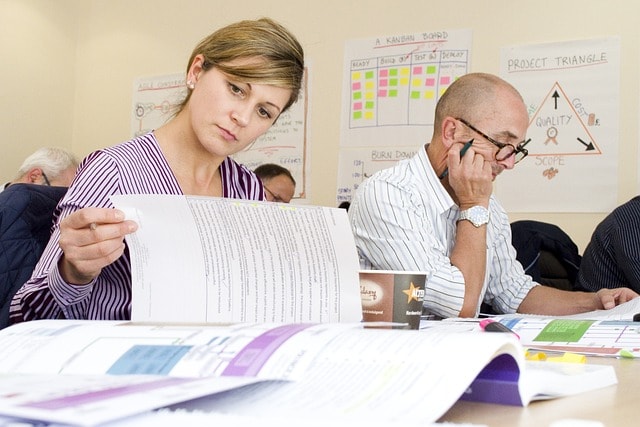
.jpg)
Managing Global Projects Across Time Zones
Published on December 9 2024
By Marianella Saavedra Terkes · 9 minute read
In today’s digital landscape, managing NoCode projects requires more than technical expertise. As a Project Manager at Kreante, I’ve learned that successful project delivery hinges on strategic time management and collaboration across time zones. By understanding and leveraging these differences, we create a seamless workflow that bridges geographical divides. Well-documented project processes created at the start enable us to maintain momentum and achieve milestones efficiently. This approach turns potential time zone challenges into opportunities for continuous progression, consistently delivering high-quality results. Effectively managing these dynamics showcases the evolving nature of project management in a connected world.

The New Reality of Project Management
The beauty of NoCode development lies in its ability to seamlessly connect talent and clients across the vast expanse of the world. Our team regularly collaborates with clients from different continents, making strategic time zone management a critical success factor. By viewing time differences not as obstacles but as opportunities, we transform them into continuous project progression advantages. This approach enables us to maintain momentum around the clock, ensuring that our projects are always moving forward. It also allows us to tap into diverse perspectives and expertise, enhancing creativity and innovation within our teams. By leveraging the unique advantages of each time zone, we can provide faster response times and more flexible scheduling options for our clients, ultimately delivering high-quality results that exceed expectations. This strategic approach aligns with portfolio management principles, ensuring that we select and manage projects efficiently to enhance success rates and reduce risks. Additionally, our platform offers familiar features that enhance user experience and make it easy to add new functionalities to applications.
Project Management Fundamentals
Mastering project management fundamentals is crucial for success in managing projects. At its core, project management involves understanding the process, essential for ensuring successful outcomes. This involves defining the project scope, setting realistic goals and objectives, identifying and managing stakeholders, and developing a comprehensive project plan.
Defining the project scope is vital for effective planning, as it sets boundaries and deliverables, ensuring clarity for team members and stakeholders. Setting realistic goals and objectives provides a roadmap for measuring progress.
Effective stakeholder management is key to success, involving understanding their needs, communicating effectively, and building strong relationships.
A comprehensive project plan outlines tasks, timelines, and resources needed to achieve goals, guiding the team towards aligned objectives.
By mastering these fundamentals, project managers can deliver projects on time, within budget, and to the required quality standards, ensuring successful outcomes. For further insights on handling challenging project scenarios, visit this article on Mastering Difficult Client Conversations in 2025.
Characteristics of Global Projects
Global projects are inherently complex, involving a wide array of stakeholders, diverse cultures, and multiple time zones. Successfully managing these projects requires a deep understanding of the global business environment, including cultural nuances and language barriers. Virtual teams necessitate specialized strategies for effective communication and collaboration.
Key factors for successful global project management include:
Cultural Awareness: Understanding cultural norms, business practices, and regulations is essential. This awareness helps prevent misunderstandings and ensures smooth project execution.
Communication Strategies: Managing virtual teams effectively requires cross-cultural communication skills. This involves maintaining momentum and alignment through flexible methods and digital tools for collaboration.
Regulatory Compliance: Navigating different regional regulations is vital. Ensuring compliance with local standards helps avoid legal issues and project delays.

Building Effective Communication Frameworks
Achieving successful project delivery hinges on establishing robust communication frameworks, which we build through several core strategies:
Defined Communication Windows per Time Zone: By specifying distinct time slots for communication, we ensure that team members across various regions can engage effectively without overlapping schedules. This method fosters inclusivity, ensuring everyone is aligned and contributing to a unified project vision.
Regular Check-ins Accommodating All Stakeholders: Consistent meetings are scheduled to suit the diverse time zones of our team and clients. These check-ins are crucial for monitoring progress, addressing concerns, and aligning on project goals, thus maintaining project momentum.
Dedicated Asynchronous Channels for Continuous Updates: By utilizing tools like Slack and email, we create channels that allow team members to share updates and feedback without needing to be online simultaneously. This flexibility ensures smooth communication flow, enabling contributions at individual convenience and keeping everyone informed on project developments.
For more insights on enhancing communication in project management, visit this article on Mastering Clear Communication in Project Management.
Tools and Platforms for Project Success
Successful project management thrives on a robust digital ecosystem. Beyond our NoCode platforms, we utilize a suite of collaboration tools essential for effective project execution:
Notion centralizes documentation, ensuring accessible and organized project information for all team members.
Monday provides project tracking and timeline management, visually representing progress to identify bottlenecks and allocate resources efficiently.
Whimsical and Figjam facilitate collaborative brainstorming and workflow mapping, encouraging creativity and innovation through intuitive visual tools.
Figma streamlines design collaboration and prototyping, enabling seamless teamwork among designers and developers to produce high-quality outputs.
Slack ensures immediate team communication, supporting real-time interactions and quick decision-making.
Email handles formal communications and updates, keeping stakeholders informed and providing a reliable communication record.
This toolkit ensures smooth collaboration across locations, fostering real-time cooperation and efficient project progression. By integrating these tools, we create a cohesive digital environment that meets the diverse needs of our team and clients, driving project success.
Cultural Considerations in Project Management
Technical skills alone don’t guarantee project success. Understanding regional business practices and communication preferences proves equally important. In public project management, this includes recognizing how various government agencies are involved in managing public works and facilitating contract opportunities. This awareness helps prevent misunderstandings and strengthens client relationships across different regions.

Stakeholder Management
Stakeholder management is essential in project management, focusing on identifying, analyzing, and addressing stakeholder needs and expectations. Stakeholders include team members, customers, sponsors, and any individuals or organizations with a vested interest in the project.
Effective management starts with identifying and understanding stakeholder needs and interests, which helps project managers devise strategies to address their concerns and secure their support.
Clear communication is vital for building trust and managing expectations. Regular updates, transparency, and active listening keep stakeholders informed and engaged, fostering a collaborative environment aligned with project goals.
Building strong relationships with stakeholders is crucial for project success. This involves understanding their perspectives and addressing concerns promptly, ensuring their active participation and support.
Mastering stakeholder management involves understanding needs, effective communication, and relationship-building skills. By excelling in these areas, project managers can execute projects successfully, achieving high stakeholder satisfaction.
Maintaining Project Momentum
Successful projects hinge on maintaining consistent progress despite time differences. We achieve this with well-documented processes and decisions, providing a reliable reference for all team members. This ensures everyone is aligned and can easily follow the project's trajectory. Clear handoff procedures between time zones are vital, enabling smooth transitions and minimizing workflow disruptions. By establishing these protocols, each team member knows their responsibilities and can efficiently continue work where others left off. Proactive problem-solving is crucial to prevent delays. Our team anticipates potential challenges and addresses them promptly, maintaining momentum and meeting deadlines. This approach enhances efficiency and builds client trust, showcasing our commitment to delivering high-quality results.

Turning Time Zone Challenges into Advantages
What initially seems like a logistical challenge can transform into a strategic advantage. Managing projects across time zones offers numerous benefits:
Extended Working Hours: By staggering team schedules, we ensure continuous project progress beyond traditional working hours.
Faster Client Response Times: Leveraging time differences allows teams in different zones to seamlessly continue work, minimizing downtime and enhancing responsiveness.
Flexible Meeting Schedules: Accommodating diverse time zones promotes inclusivity and supports a healthier work-life balance for all team members.
Optimized Development Cycles: Implementing a "follow-the-sun" model enables continuous task handoffs, quicker iterations, and faster project completion.
Embracing the Global Workforce
We've been able to tap into a diverse pool of talent and expertise. This approach not only enhances creativity and innovation but also allows businesses to operate more dynamically by ensuring the right person is in the right role. The ability to collaborate across borders and time zones empowers teams to deliver high-quality results while adapting to the ever-changing demands of the global market. As businesses continue to expand their reach, the strategic management of time zones becomes a crucial component in achieving success on a global scale.
Project Manager Role
The project manager's role is crucial to project success. They are responsible for planning, organizing, and controlling resources to meet specific goals. Strong leadership, communication, and problem-solving skills are essential for managing teams, stakeholders, and sponsors effectively.
In planning, project managers define scope, set goals, and create comprehensive plans to align team members and stakeholders with project objectives. Organizing involves task allocation, timeline management, and ensuring resource availability to maintain momentum and keep projects on track.
Controlling resources requires monitoring progress, managing risks, and resolving issues. Project managers must identify challenges, devise solutions, and communicate effectively with stakeholders to keep them informed and engaged.
Mastering project management fundamentals like scope, time, budget, and quality management enables project managers to lead teams, manage expectations, and successfully execute projects, delivering high-quality results that satisfy stakeholders.

Project Management Approaches
In project management, selecting the right approach is vital for success. Different methodologies offer unique tools and techniques tailored to specific needs, helping project managers navigate complexities effectively. Popular approaches include Agile, Scrum, Waterfall, and Hybrid.
Agile is known for flexibility and iterative processes, ideal for projects needing frequent adjustments. It emphasizes collaboration, customer feedback, and rapid releases.
Scrum, a form of Agile, focuses on delivering work in sprints, allowing regular reassessment and adaptation.
Waterfall follows a linear process, suitable for projects with clear, well-defined requirements.
Hybrid combines Agile and Waterfall elements, offering flexibility to tailor approaches based on specific project needs.
By choosing the right project management approach, managers can effectively utilize tools and techniques for successful delivery and high-quality results.
Virtual Project Management
Virtual project management is essential for organizations with teams spread across different locations. By leveraging technology, it bridges physical distances, enabling seamless communication and collaboration.
A strong digital infrastructure is crucial for effective virtual project management. Tools like video conferencing, project management platforms, and instant messaging are vital for maintaining clear communication. They facilitate real-time interactions, allowing team members to discuss details, share updates, and resolve issues promptly.
One major benefit of virtual project management is access to a global talent pool. Organizations can unite experts from various regions, enhancing creativity and innovation. This diversity enriches project outcomes and fosters a dynamic team environment.
Additionally, virtual project management offers scheduling flexibility, accommodating different time zones and personal commitments. This flexibility improves work-life balance, boosting morale and productivity.

Managing Project Risks and Issues
Managing project risks and issues is vital for successful project completion. This involves identifying, assessing, and mitigating risks and issues that may affect the project.
The first step is developing a risk management plan, outlining strategies for handling risks throughout the project. This plan guides the team in proactively addressing potential challenges.
Identifying and assessing risks helps understand their potential impact, allowing project managers to prioritize and develop mitigation strategies. Anticipating risks enables preventive measures to minimize their effects.
Effective risk management maintains project momentum through strategies like risk avoidance, mitigation, transfer, or acceptance. This ensures the project stays on track and issues are resolved promptly.
Additionally, addressing project issues involves identifying and resolving problems as they arise, preventing derailment. Open communication and collaboration help resolve issues efficiently.
By focusing on risk and issue management, project managers navigate uncertainties, ensuring successful completion and high-quality outcomes.
Best Practices for Time Zone Management
Document everything meticulously in our shared Notion workspace for transparency and easy access, fostering accountability and quick retrieval of project details.
Use Monday for project tracking and timeline management to visualize progress and spot potential bottlenecks, ensuring task alignment with project goals.
Maintain consistent communication through Slack for immediate exchanges and email for formal updates, addressing urgent issues promptly and keeping stakeholders informed.
Plan buffer time for unexpected challenges like technical glitches or last-minute client requests, preventing project flow disruptions.
Respect local working hours and schedules to promote a healthy work-life balance, enhancing team productivity and fostering trust among members.

The Future of Project Management
As no-code platforms continue evolving, managing projects across time zones becomes increasingly seamless. The ability to collaborate effectively while maintaining high-quality project delivery has become a crucial skill in modern project management. With advancements in digital tools and a deeper understanding of time zone dynamics, project managers are better equipped to handle complex projects that span multiple regions. This evolution enhances the efficiency of project workflows and empowers organizations to leverage global talent, ensuring that projects are delivered on time and to the highest standards. The future of project management is poised to embrace these changes, offering more agile and responsive solutions to meet the demands of a rapidly changing business landscape.
Impact on Project Outcomes
This strategic approach to project management often results in:
Faster development cycles through optimized workflows More effective collaboration through proper tool utilization Increased client satisfaction through responsive service Enhanced project resilience through structured communication
For businesses working with teams and clients across America, remember that success relies not just on technical capabilities but on thoughtful management of time zones and regional differences. At Kreante, we've turned these challenges into opportunities for delivering exceptional results to our client base nationwide.











